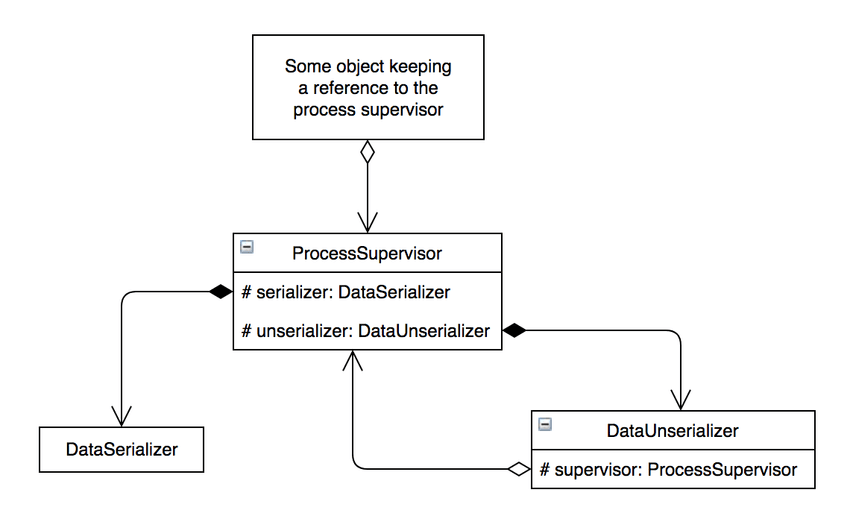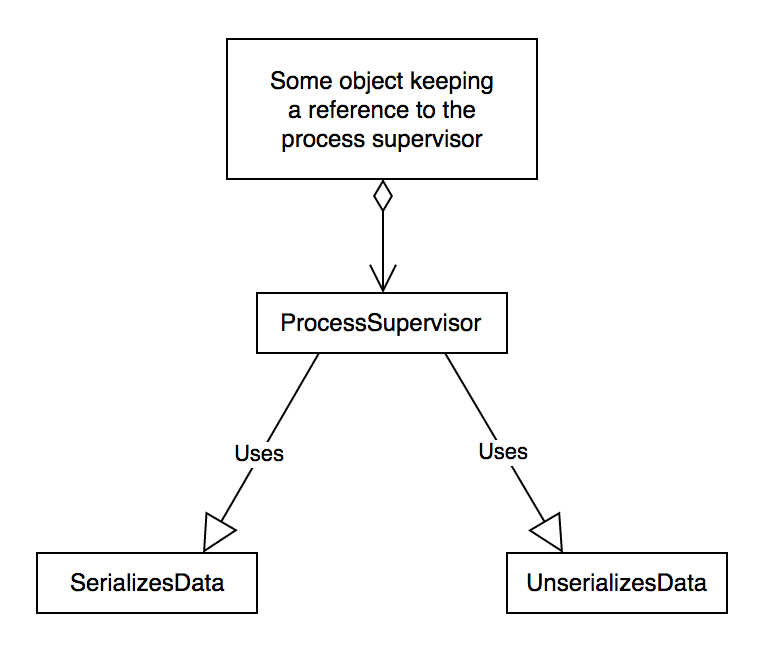About circular references in PHP
Published , by Johann Pardanaud
Let me talk about some issues I encountered with circular references while working on my PuPHPeteer library.
How you can end up with circular references
Under the hood, PuPHPeteer uses Rialto, a library I've created for the occasion. Rialto is a library to manage Node resources, therefore it needs to create a Node process and communicate with it. To do so, it has a ProcessSupervisor class which handles everything. In the early stage development, this class was handling way too much features.
To improve the separation of concerns, I've moved all the functions handling data serialization to two new classes: DataSerializer and DataUnserializer. That way, the ProcessSupervisor class only had to instanciate these two classes and use their public methods.
However, the DataUnserializer class needed to keep a reference to its ProcessSupervisor parent (so it can transmit the reference to some classes it creates on unserialization). We had this code organization:
And this is where we have an issue: if the root object is destroyed, the ProcessSupervisor and DataUnserializer instances will stay alive because they reference each other.
How circular references can be harmful
Some languages can handle them pretty well, but since PHP's garbage collector is using reference counting, the two instances will be destroyed only once PHP shuts down:
Fortunately, PHP will clean up this data structure at the end of the request, but before then, this is taking up valuable space in memory.
– php.net
However, memory isn't the only issue here. Let me take another example with Rialto: the ProcessSupervisor uses the __destruct method to kill the Node process once the class is no longer used, and here's what the PHP documentation states:
The destructor method will be called as soon as there are no other references to a particular object, or in any order during the shutdown sequence.
– php.net
This means the Node process will be kept alive until PHP shuts down because there will still exist a reference to the ProcessSupervisor instance.
So, having a circular dependency in PHP can be harmful for two reasons:
- Memory allocation: if your instances store large chunks of data (arrays with thousands of very long strings, etc…).
- Destruction: if your instances needs to do some cleanup on destruction, the cleanup will only happen on PHP shutdown.
Ultimately, these issues will bother you essentially with long running processes, but even with simple web requests there could some side effects if your classes allocates a high volume of memory or needs to do proper cleaning at the right time.
How you can solve circular references
You have three ways to solve your circular references issues:
Use weak references
A weak reference is a reference that does not protect the referenced object from collection by a garbage collector.
Weak references is a missing language feature in PHP. You will need to use an extension. You can use either WeakRef or PHP Ref, I will use the first one below.
Since this solution requires a PHP extension, it's not the best choice if you're writing a library or a command line, but if you're creating a website you will manage by yourself then it's probably what you should use.
Here's a code example:
class ParentClass
{
public function __construct()
{
$this->child = new ChildClass($this);
}
}
class ChildClass
{
public function __construct(ParentClass $parent)
{
$this->parent = new WeakRef($parent);
}
}
$instance = new ParentClass;
// Do your work...
// Once the parent instance is unreferenced, the parent and child instances will be destroyed.
unset($instance);Create a dereferencing method
If you cannot install a PHP extension (because of a shared hosting, or whatever…), you can create a method to cleanup your circular references.
However, this solution requires to call explicitly the dereferencing method, otherwise your circular reference will remain until PHP shuts down.
Since you're required to call a method, this might not be the best idea for a library. Here's an example of the implementation:
class ParentClass
{
public function __construct()
{
$this->child = new ChildClass($this);
}
public function destroy()
{
$this->child->destroy();
}
}
class ChildClass
{
public function __construct(ParentClass $parent)
{
$this->parent = $parent;
}
public function destroy()
{
// By setting the parent property to null, you remove the circular reference.
$this->parent = null;
}
}
$instance = new ParentClass;
// Do your work...
// Before unreferencing the parent, call the destroy method.
$instance->destroy();
// Unreference the parent
unset($instance);Change your code structure
If you don't want to add a derefencing method because you're creating a library and you want to keep the API really simple, you might want to change your code structure.
This is what I did with Rialto. I didn't want to put back the unserializing methods in the ProcessSupervisor class, so I went with a different solution and replaced the DataUnserializer class by a UnserializesData trait which is imported in the ProcessSupervisor class. Here's the new code organization:
However, this is not always possible! I was able to do it here because Rialto used only one instance of the DataUnserializer class. If I had used multiple instances of this class (for… reasons), I could not have done that.
This could be way better
PHP is a real mess when it comes to manage circular references. A RFC was proposed to add a SplWeakRef class to the standard PHP library, but it is marked as inactive…
In the other hand, not having weak references wouldn't be an issue if PHP's garbage collector used the tracing algorithm, but instead we have that crappy reference counting…
If you encounter circular references in your code, two words: good luck!

